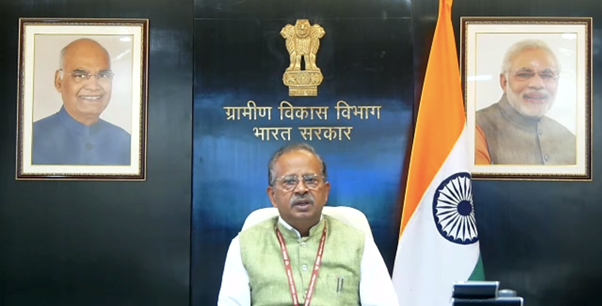DAY-NRLM organises National Discourse on Food, Nutrition, Health and WASH (water, sanitation and hygiene)
“SHGs can play a vital role in addressing issues related to malnutrition at the household level,” said Shri Nagendra Nath Sinha, Secretary, M/o Rural Development. He was speaking at the National Discourse on Food, Nutrition, Health and WASH (FNHW) organised by Deendayal Antyodaya Yojana-National Rural Livelihoods Mission (DAY-NRLM), a flagship programme under the Ministry, with the support of UNICEF supported Roshni Centre and BMGF supported PCI. The main topic for deliberations was “Leveraging DAY-NRLM’s Women Collectives for strengthening Health Seeking Behaviour among SHG households for improved health outcomes”. In addition to activities related to behaviour change, he said women collectives have initiated work to address gender issues like women eating last and least in their families and these should be taken forward. “The services of the rural women can be taken for public services like immunisation and institutional delivery,” he added.
Smt. Nita Kejrewal, Joint Secretary, MoRD explained the DAY-NRLM strategy for FNHW integration including system strengthening, convergence with line departments and between SRLM verticals, social behaviour change communication and promoting FNHW Enterprises. She also highlighted the need to promote health-seeking behaviour and the need to converge with M/oH&FW & M/oAYUSH.
Over 5000 state mission staff and women collective members from across India participated in the event. SHG members who are trained as Community Resource Persons or CRPs from Tamil Nadu, Odisha and Meghalaya made special presentations. “In the last 4 years, we have produced and supplied 463 lakh napkin packets. We supplied around 80 Lakh belt type napkin packets worth 16.75 crores to post-natal mothers, women prisoners and hospital inpatients through the health department,” said Smt. Nagalakshmi, President, CLF, & member Tamil Nadu Sanitary Napkin Producer Federation.
Smt. Shyamla, a Woman Health Volunteer under Tamil Nadu SRLM’s NCD screening programme also shared her experience. “I was trained by the health department to screen patients with Diabetes and Hypertension using a Glucometer & BP apparatus. I also screen patients with oral/cervical cancer, breast cancer, TB, Leprosy etc,” she shared. After her referrals to the Block Medical Officer, diseases are confirmed and medicines are delivered as per prescription at the doorstep.
Smt. Jhunu Behera, an FNHW CRP from the Odisha SRLM shared how women collectives make Poshan Micro plans where they identify and prioritise nutrition issues for women and adolescents, and plan for action. “We counsel women on dietary diversity during the Maitri Baithaks and also organise Pushti Mahotsav’s which are local food festivals in villages to promote the consumption of indigenous food,” she said.
Smt. Bariehtngen Makdoh, FNHW CRP, from Meghalaya SRLM spoke of how she has been trained to discuss FNHW topics in her SHG meetings. “I am now training other SHG leaders to do so, so that awareness is built in our communities,” referring to the discussions in a group meeting and peer learning approach.
Stressing the tremendous potential of the SHG network Dr Sila Deb, Additional Commissioner, M/o H&FW said “SHG women can play a role in disseminating key messages to reach rural communities, to improve women’s decision making and access to services.” She highlighted that there are opportunities for preventive care as well as generating livelihood by working in convergence with MoRD. Dr Tanuja, Manoj Nesaari, Director, All India Institute of Ayurveda, M/o AYUSH, also highlighted that growing ayurvedic herbs in kitchen gardens can be promoted and packaging products made from these herbs can be a livelihood opportunity.
Presentations were also made by Sh. Ramakrishna Chitturi, CEO, Meghalaya SRLM. He presented the SRLMs work to set up sector meetings for convergent action by the Dept of Health, Community and Rural Development, and the Social Welfare Department to enhance access to services at PHCs and CHCs in rural communities. Smt. Muthumeenal Pallavi Baldev, Add’l CEO, Tamil Nadu SRLM shared the experience of engaging SHG women for population-based screening of non-communicable diseases and of supplying sanitary napkins to the dept. of health. Ms. Mansi Nimbhal, CEO, Odisha SRLM shared the experience of improving dietary diversity through the work of Community Institutions and food festivals or ‘pustimahotsav’.
This discourse was organised as part of ongoing activities for ‘Amrit Mahotsav’ to commemorate the 75th anniversary of Independence. It served as a platform for knowledge exchange and states to highlight their achievements and successful approaches at the national level.

